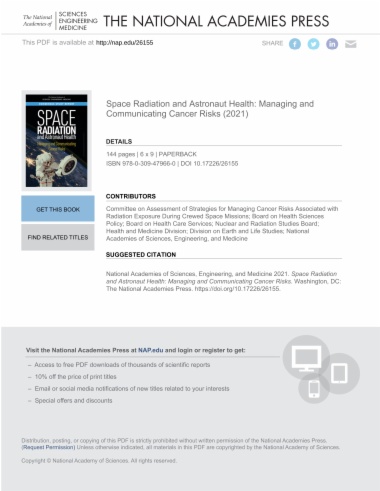

Astronauts face unique health-related risks during crewed space missions, and longer-duration missions that extend to greater distances in our solar system (including to the Moon and Mars) will likely increase those risks. Cancer risks due to ionizing radiation exposure are one of these health-related risks. Assessing, managing, and communicating radiation-induced cancer risks associated with spaceflight are challenging because of incomplete knowledge of the radiation environment in space, limited data on radiation-induced cellular damage mechanisms, lack of direct observations from epidemiological studies, and the complexities of understanding radiation risk.
At the request of the National Aeronautics and Space Administration (NASA), an ad hoc committee of the National Academies of Sciences, Engineering, and Medicine convened to provide advice on NASA's proposed updates to their space radiation health standard, which sets the allowable limit of space radiation exposure throughout the course of an astronaut's career. Space Radiation and Astronaut Health: Managing and Communicating Cancer Risks provides the committee's recommendations and conclusions regarding the updated space radiation health standard, NASA's radiation risk communication strategies, and a process for developing an ethics-informed waiver protocol for long-duration spaceflight missions.